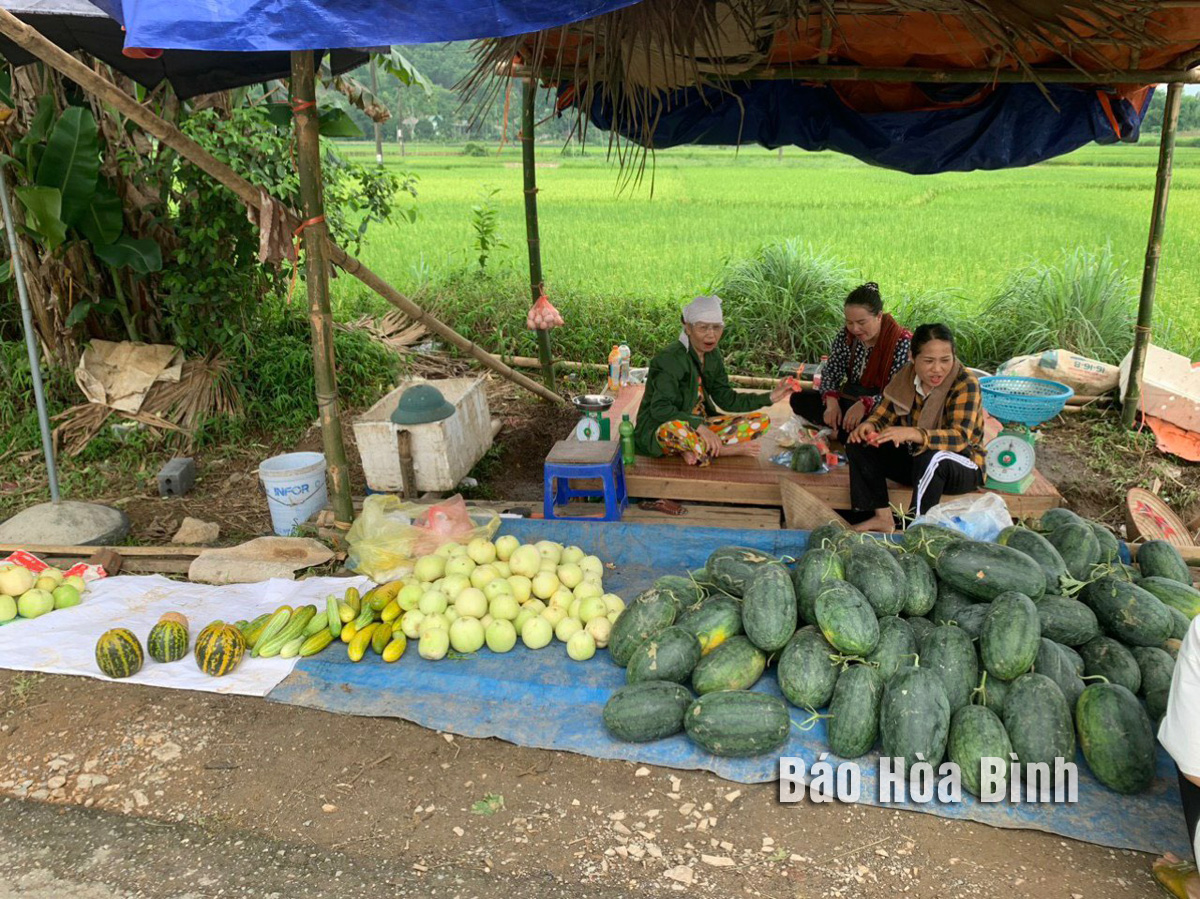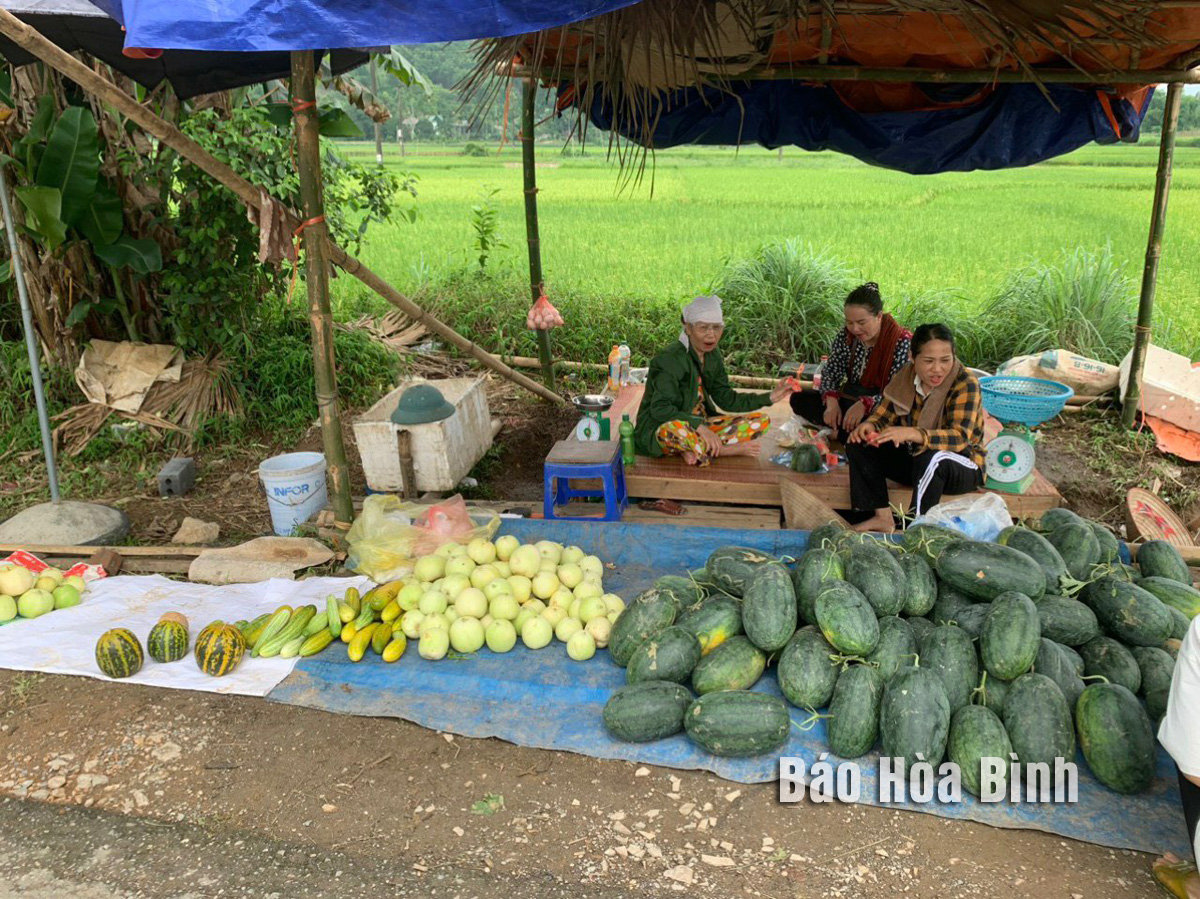
Currently, farmers in Kim Boi district are busy harvesting various types of melon, such as honeydew melon, cucumber, and watermelon. The cultivation of these plants has so far helped farmers maximise land use, enhance production value per unit area, and contribute to the restructuring of local crops.

Farmers from Sao Bay commune sell melons along a national
highway.
These days, local growers are working hard to reap the fruit
of their labour. In addition to wholesale, they sell melons at local markets
and roadside stalls. Favourable prices have been recorded, with watermelons
sold for 10,000-15,000 VND (0.4-0.6 USD) per kg, and cucumbers and honeydew
melons for 12,000-15,000 VND per kg.
According to the Kim Boi Department of Agriculture and Rural
Development, this spring crop saw over 52 hectares of watermelons, nearly 300
hectares of cucumbers, and over 52 hectares of honeydew melons planted. Their
plantations concentrate in the communes of Du Sang, Vinh Dong, Sao Bay, Nam
Thuong, and Kim Lap. Harvesting progress now varies from 50-80%, with the rate
for cucumbers topping, at over 80%.
In recent years, Vinh Dong commune has seen many households
opting to plant cucumber. Its cultivation is relatively simple and it can bring
about higher income than rice, with stable market demand. Bui Thi Anh, a
resident in Chieng hamlet in Vinh Dong, said: "This season, my family grew
over 1,000 square meters of cucumber As soon as we harvest, traders and locals
buy them immediately."
Deputy Director of the department Nguyen Thi Minh Anh noted
that these crops suit the local soil and climate, therefore, the district
encourages farmers to actively shift crop structure to maximise land use and
increase income. This year’s early hot weather has boosted melon consumption as
they are sought-after for summer cooling.
According to her, from the beginning of the season, the
district collaborated with specialists to train farmers in melon cultivation
and caring techniques toward the best yields and quality. However, due to the
lack of a product purchasing unit, melons are still retailed, resulting in
unstable prices. Moving forward, the district will encourage growers to
continue maintaining their growing areas and advise them to avoid overplanting
to prevent oversupply and subsequent price drops, thus negatively impacting
their livelihoods.
According to data from the Hoa Binh Provincial Party Committee, the industrial production index for the first six months of 2025 is estimated to have increased by 20% compared to the same period last year. This marks the highest year-on-year growth rate for this period since 2020.
In the first six months of 2025, Hoa Binh province’s export turnover was estimated at 1.145 billion USD, marking an 18.11% increase compared to the same period in 2024. Import turnover was estimated at $ 804 million, a 17.15% increase, which helped the province maintain a positive trade balance.
The lives of the ethnic minority farmers in Tan Lac district have gradually improved thanks to the new directions in agricultural production. This is a testament to the collective strength fostered through the professional associations and groups implemented by various levels of the district’s Farmers’ Union.
With the motto the "product quality comes first,” after nearly one year of establishment and operation, Muong village’s Clean Food Agricultural and Commercial Cooperative, located in Cau Hamlet, Hung Son Commune (Kim Boi district), has launched reputable, high-quality agricultural products to the market that are well-received by consumers. The products such as Muong village’s pork sausage, salt-cured chicken, and salt-cured pork hocks have gradually carved out a place in the market and they are on the path to obtaining the OCOP certification.
In the past, the phrase "bumper harvest, rock-bottom prices" was a familiar refrain for Vietnamese farmers engaged in fragmented, small-scale agriculture. But today, a new spirit is emerging across rural areas of Hoa Binh province - one of collaboration, organisation, and collective economic models that provide a stable foundation for production.
Maintaining growing area codes and packing facility codes in accordance with regulations is a mandatory requirement for agricultural products to be eligible for export. Recently, the Department of Agriculture and Environment of Hoa Binh province has intensified technical supervision of designated farming areas and packing facilities to safeguard the "green passport" that enables its products to access international markets.



